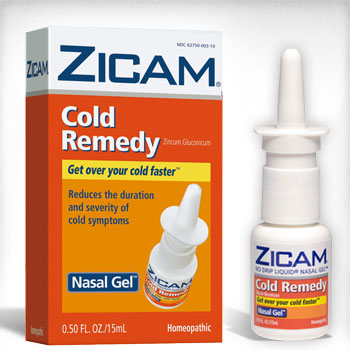Posts Tagged ‘ Smell ’
Whatever Happened to that Zicam Securities Lawsuit?
June 16th, 2010. By AbiK
 Wrong time of year to be thinking about Zicam, but hey, legal decisions happen when they happen. And so it was for Zicam earlier this week when the US Supreme Court gave the go-ahead to consider the challenge Zicam-maker Matrixx Initiatives Inc. is bringing against the lawsuit that claimed Matrixx had failed to inform investors of its little loss-of-smell issue.
Wrong time of year to be thinking about Zicam, but hey, legal decisions happen when they happen. And so it was for Zicam earlier this week when the US Supreme Court gave the go-ahead to consider the challenge Zicam-maker Matrixx Initiatives Inc. is bringing against the lawsuit that claimed Matrixx had failed to inform investors of its little loss-of-smell issue.
The Zicam securities lawsuit, as reported in the Wall Street Journal, has been going on now since 2005—it was first thrown out and then just last year (when it became a hot news topic again) it was reinstated by an appeals court.
But this isn’t about noses that can no longer smell—well, sort of. It’s about the fact that even though Matrixx apparently knew of some “adverse event” reports (i.e., 12 reports between 1999 and 2003 of folks who claimed to have lost their sense of smell after Zicam use), the company still marketed the over-the-counter sniffle reliever in a positive light—no hint of any potential problems regarding ability to smell. And, the plaintiffs have gone as far as to claim that the marketing statements made by Matrixx were false and misleading and—here’s what’s at the crux of this—inflated the stock price of the company.
So, as you can see, for these plaintiffs, it’s not about personal injury; it’s about securities.
Needless to say, Matrixx is countering the above allegations saying that the adverse event reports were not statistically significant enough, and that no true causal relationship had been established, so what’s the beef? (beef being my word, not thatof Matrixx, of course). The petition Matrixx submitted to the Supreme Court also states Matrixx’s position that reinstating this lawsuit “would have immense consequences for the pharmaceutical industry, potentially making companies liable for securities violations if they didn’t disclose even small numbers of adverse-incident reports.”
So that’s the latest, and now that the Court has agreed to consider Matrixx’s challenge, WSJreports that oral arguments will most likely begin in the fall. Hmm, just in time for cold season…
How to Handle the Co-Worker you can’t Febreeze
March 18th, 2010. By AbiK
 Remember the one about the airline passenger that was booted off a Jazz Air flight because he smelled?
Remember the one about the airline passenger that was booted off a Jazz Air flight because he smelled?
Hey, don’t underestimate that ol’ olfactory system. Think I’m kidding? One woman’s sense of smell just netted her a $100,000 settlement. How? As a Detroit city employee, Susan McBride had complained about a co-worker’s perfume and room deodorizer (must’ve been into fragrance layering)—that the smell of them made it difficult for her to breathe. She also complained of migraine headaches, nausea and coughing.
From a report on The Early Show (CBS), it seems McBride’s boss didn’t respond to her complaints, and apparently didn’t tell the co-worker with the love of all things aromatic that there was a teensy little issue that, quite frankly, she stunk and it was unbearable.
So, McBride sued.
Here’s the kicker—Detroit city employees in three buildings (yes, three!) are now being warned not to wear anything that delivers a scent—no top notes of jasmine, no undertones of sandalwood, skip the tea rose-scented potpourri, the eponymous Tim McGraw cologne, the Glade plug-ins, and by all means, leave the Red Door at the door. The Early Show report also mentions folks should leave behind the deodorant, though if you’re flying Jazz Air you may want to pack a travel size somewhere—just in case.
Seems the question here comes down to a question of rights. And, as labor and employment lawyer Joelle Sharman is quoted as saying on The Early Show, “A person doesn’t necessarily have a right to wear perfume, but the person does have a right to be able to breathe in the workplace. So if an employee comes into work and says to his or her boss, “I can’t breathe, this perfume is triggering a condition that is affecting my ability to breathe in the workplace,” and reports to his or her boss, the boss has to reasonably accommodate that person.”
Archive by Category
- Accidents (24)
- Airlines (9)
- Asbestos Mesothelioma (262)
- Automotive (25)
- Celebrity (14)
- Class Action (84)
- Complaints/Comments (15)
- Consumer Fraud (84)
- Contest (2)
- Court of Public Opinion (5)
- Crazy Sh*t Lawyers See (61)
- Criminal Law (4)
- Defective Products (111)
- DePuy ASR Hip Recall (2)
- Discrimination (22)
- Drugs/Medical (248)
- Elder Care Abuse (4)
- Emerging Issues (462)
- Employment (54)
- Environment (52)
- Financial (28)
- Food Illness (15)
- Human/Civil Rights (4)
- Insecurities (5)
- Insurance (16)
- Intellectual Property (16)
- Internet/E-commerce (19)
- lawsuits (161)
- Lawyers (20)
- Lawyers Giving Back (43)
- Lex Levity (10)
- Personal Injury (106)
- Pleading Ignorance (53)
- Real Estate (2)
- Recall (6)
- Scam (3)
- Securities (13)
- Settlement (81)
- Tort Reform (2)
- Totally Tortelicious (81)
- Veterans (11)
- Whistleblower (9)